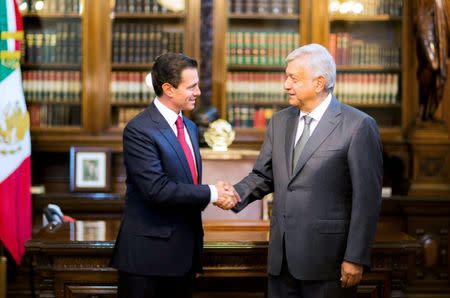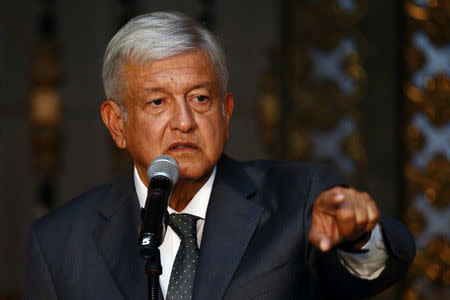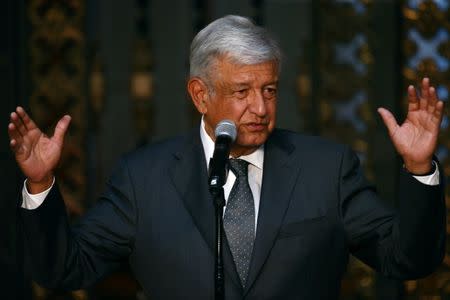Mexico's Lopez Obrador meets outgoing president, wants three-year referendum
By Daina Beth Solomon
MEXICO CITY (Reuters) - Mexico's president-elect, Andres Manuel Lopez Obrador, met with the country's outgoing leader on Tuesday, hours after the leftist said he would put his job on the line to a recall referendum half-way through his six-year term.
Lopez Obrador, who won a landslide victory in Sunday's election and takes office in December, traveled in a white Volkswagen sedan on Tuesday to the meeting with centrist President Enrique Pena Nieto in the presidential palace in the capital's colonial downtown district.
Lopez Obrador and Pena Nieto were due to discuss the 2019 budget, trade and energy policy. The president-elect said he would hold a news conference after the meeting.
The former mayor of Mexico City won 53 percent of the vote on Sunday, the largest margin for a presidential election since the early 1990s, giving him a strong mandate to make deep changes to policy at home and abroad.
Lopez Obrador discussed immigration, trade and security with U.S. President Donald Trump on Monday.
His pick as foreign minister, Hector Vasconcelos, said on Tuesday the call between the two leaders, conducted via translators, had provided a reset in strained relations between the two countries.
"It was very successful, characterized by absolute mutual respect," he told TV network Televisa, saying there was no date yet for the two men to meet.
Lopez Obrador, who shuns bodyguards, was surrounded by TV cameramen on motorbikes during his drive to the palace, and arrived there to a turbulent media scrum.
He said he sought to unite the country.
"I'm looking forward to conciliation to seek an organized transition for everyone," Lopez Obrador told reporters, who pushed and shoved in a bid to speak with him. "I don't want bodyguards ... we won't act in that way, but I also don't want to be squashed."
Lopez Obrador vows to improve lives for Mexicans and the country's global reputation by ending corruption, applying the law and reducing the wealth gap.
In a TV interview late on Monday, he said he would hold a recall referendum after three years to ask the public whether it still had faith in his presidency. He had previously said he would hold a referendum every two years.
"Just as they elected me, they'll have the chance to remove me, but I'm sure I'll win as there will be results," he said, reiterating a campaign promise.
POPULAR CONSULTATIONS
The 64-year-old has not given specific details of how the "popular consultation" would be carried out. Mexico's constitution does not mention recall referendums.
The head of the National Regeneration Movement (MORENA) has previously suggested he could put a series of economic reforms - which include oil, education and telecoms overhauls pushed through Congress by Pena Nieto - to public referendums, but has given few details.
In Monday's interview, Lopez Obrador also said he would not make any attempt to run for a second presidential term, which is currently prohibited by the law, and would require a constitutional change.
Recall referendums have a checkered past in Latin America, where political control has often swung between the left and right.
In 2004, Venezuela's opposition called such a plebiscite to try and oust socialist former President Hugo Chavez. Nonetheless, Chavez went on to win the referendum, clinching 59 percent of the vote.
For over a decade, Lopez Obrador has faced attacks from critics who alleged he was a socialist in the mold of Chavez, and could take Mexico down a similar path as struggling Venezuela.
Lopez Obrador has rejected such comparisons, and in the final days of his campaign, committed to respect central bank independence, individual liberties and free enterprise, saying there would be no "dictatorship" in Mexico.
Agustin Basave, a lawmaker with the Party of the Democratic Revolution (PRD), which Lopez Obrador led before forming his own party in 2014, said the referendum would strengthen Lopez Obrador if he were to win it, but would not help the country.
"In terms of governability, it doesn't help. It causes harm. Because effectively, you have doubt over how long his term will last," he said. "And what if he loses the referendum?"
(Additional reporting by Diego Oré and Gabriel Stargardter; Writing by Gabriel Stargardter; Editing by Frank Jack Daniel and Bernadette Baum)




